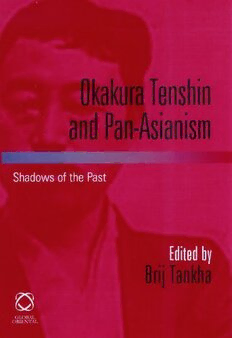
Okakura Tenshin and Pan-Asianism: Shadows of the Past PDF
Preview Okakura Tenshin and Pan-Asianism: Shadows of the Past
2524_Prelims.qxp 10/29/08 4:12 PM Page i OKAKURA TENSHIN AND PAN-ASIANISM 2524_Prelims.qxp 10/29/08 4:12 PM Page ii Okakura Tenshin, 1862–1913 2524_Prelims.qxp 10/29/08 4:12 PM Page iii OKAKURA TENSHIN AND PAN-ASIANISM SHADOWS OF THE PAST Edited by Brij Tankha UNIVERSITYOFDELHI 2524_Prelims.qxp 10/29/08 4:12 PM Page iv OKAKURA TENSHIN AND PAN-ASIANISM SHADOWS OF THE PAST Okakura Tenshin and Pan-Asianism: Shadows of the Past,edited by Brij Tankha, was first published by Sampark, New Delhi, India, in 2007 This edition has been published by arrangement with Sampark, and is for sale in all countries of the world, except South and South-East Asia This edition first published 2009 by GLOBAL ORIENTAL LTD PO Box 219 Folkestone Kent CT202WP UK www.globaloriental.co.uk © Individual chapters rests with authors. © Anthology rests with editor ISBN 978–1–905246–61–8 All rights reserved. No part of this publication may be reproduced or transmitted in any form or by any electronic, mechanical or other means, now known or hereafter invented, including photocopying and recording, or in any information storage or retrieval system, without prior permission in writing from the publishers. British Library Cataloguing in Publication Data A CIP catalogue entry for this book is available from the British Library Set in Stone Serif 9.5 on 10.5 by IDSUK (DataConnection) Ltd Printed and bound in England by Athenaeum Press, Gateshead, Tyne & Wear 2524_Prelims.qxp 10/29/08 4:12 PM Page v Contents Acknowledgements vii List of Contributors ix INTRODUCTION 1 Part I: Okakura Tenshin: Crafting an Ideal 1. Okakura Tenshin and the Ideal of Pan-Asianism MATSUMOTO KENICHI 11 2. Japanese Cultural Identity and Nineteenth-century Asian Nationalism: Okakura Tenshin and Swami Vivekananda WAKAKUWA MIDORI 22 3. Okakura Tenshin: Writing a Good History upon a Modern Plan BRIJ TANKHA 27 Part II: Asian Pan-Asianisms 4. A Transnational History of Japanese Nationalism: Pan-Asianism and Islam 1900–45 SELÇUK ESENBEL 49 5. Asianism, Nationalism and Culturalism in Early Twentieth-Century China MADHAVI THAMPI 84 2524_Prelims.qxp 10/29/08 4:12 PM Page vi vi Contents PART III: Art and Asia: Varieties of Engagements 6. Landscapes of Nandalal Bose (1882–1966): Japanism, Nationalism and Populism in Modern India AIDA YUEN WONG 95 7. Voluntary Blindness YOMOTA INUHIKO 111 8. Representing Women: Problematizing an Asian Identity RAVNI THAKUR 119 PART IV: Ways of Defining Asia 9. National Bias in Identity Construction: Examples of Academic Groupings in East Asia MARGARET SLEEBOOM 135 10. Asia Is One: Visions of Asian Community in Twenty-first Century Japan TESSA MORRIS-SUZUKI 158 Index 171 2524_Prelims.qxp 10/29/08 4:12 PM Page vii Acknowledgements This collection of essays is the result of a conference on Okakura Tenshin: Pan-Asianism, Nationalism and Art that I organized in December 2002. The conference was supported by a grant from the Japan Foundation Asia Programme that enabled us to bring together scholars from different parts of the globe. Not all their contribu- tions could be used here but I would like to take this opportunity to thank all of them for making it such an enjoyable and educative experience. I would like to take this occasion to also thank in particular the JapanFoundation, especially Mr Ogawa Tadashi, former Director of the India office, with whom the idea of the conference was first mooted, and then Mr Fukazawa Yoo, the current Director of the India office for their very positive help in making this conference possible. Their staff, in particular, Ms Shalini Aggarwal, Programme Officer, was extremely helpful. The conference was organized under the East Asia Programme, Institute of Chinese Studies, CSDS. I would like to thank my colleagues there for providing an intellectual environment to discuss these ques- tions, as well as for their participation in the conference. The office staff particularly Ms Dharitri Chakraborty, Project Officer at the ICS, was extremely helpful in assisting me with the organizational work and handling the inevitable last minute problems. I would also like to thank Ms Sunanda Bhattacharjee for her help with the editing and my publisher Sunandan Roy Chowdhury for his support in bringing out the original (Sampark) edition of this book 2524_Prelims.qxp 10/29/08 4:12 PM Page viii viii Acknowledgements (2006). I am also grateful to Global Oriental for their (revised) 2009 edition and the opportunity this has brought to reach a wider audience. Brij Tankha East Asia Programme Institute of Chinese Studies, CSDS 2524_Prelims.qxp 10/29/08 4:12 PM Page ix List of Contributors Selçuk Esenbel is Professor of History in the Department of History, Bogazici University, Istanbul, Turkey, where she is in charge of East Asian Studies. Her publications include, Even the Gods Rebel: Peasants of Takino and the 1871 Nakano Uprising(1998), ‘The People of Tokugawa Japan: The State of the Field in Early Modern Social/Economic History, Early Modern Japan (Spring, 2002) and with Inaba Chiharu, The Rising Sun and the Turkish Crescent: New Perspectives in Japanese-Turkish Relations(2003). She is currently working on a book on Japan and the Islamic world. Matsumoto Kenichiis Professor at Reitaku University. He graduated from the Faculty of Economics, Tokyo University, and worked for Asahi Glass Co. Ltd. And then returned to Hosei University’s graduate school, majoring in modern Japanese literature. At the same time he began pur- suing a career as a critic and writer and gained recognition with his book Kita Ikki in his Youthin 1971. He was appointed Professor of Kyoto Seika University, and later joined Reitaku University. His works include Ishikawa Takuboku (Chikuma Shobo, 1985), Okawa Shumei, (Iwanami, 2004), Modern Asia’s History of the Spirit, (Kindai Azia seishinshi no koko- romi), (Chuokoron, 1994) which won the Asia-Pacific Prize, 1995, The Culture of Sand, Culture of Stone, Culture of Tears(Suna no bunmei, ishi no bunmei, namida no bunmei), (PHP Kenkyujo, 2003) and Kita Ikki Hyoden (Critical Biography of Kita Ikki) Iwanami, 5 vols. Margaret Sleeboom is Research Fellow at the International Institute forAsian Studies (IIAS) and at the Amsterdam School for Social Science Research (ASSR), and a lecturer in the fields of Asian studies and cultural anthropology at the University of Amsterdam. She directs the
